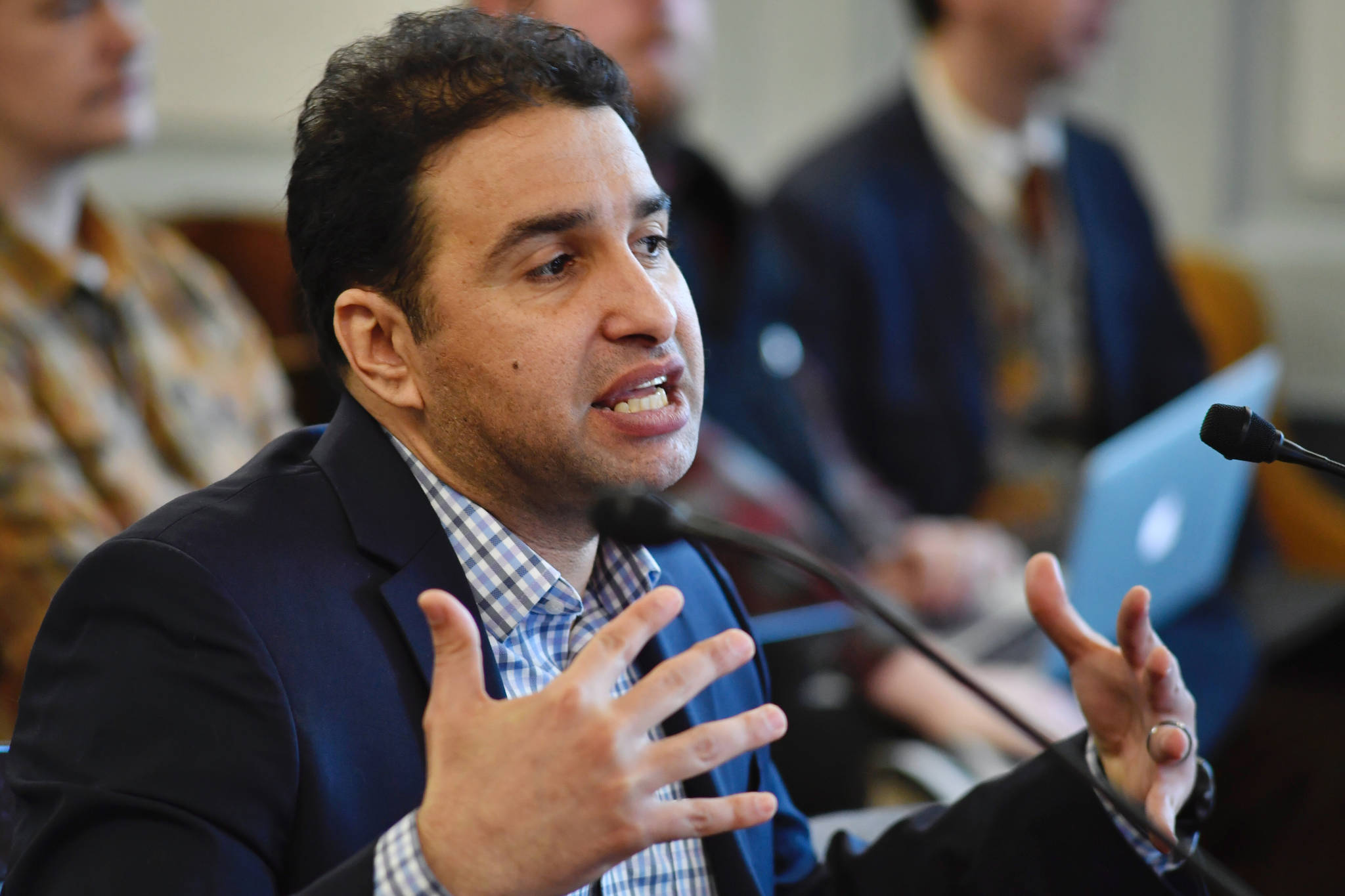Economist Mouhcine Guettabi says Alaska could lose 7,146 jobs as a result of the Gov. Mike Dunleavy’s proposed budget cuts shocking and pulling money out of the economy.
That number takes into account employment gains made from the economic injection of issuing a full Alaska Permanent Fund Dividend and Dunleavy’s ”super-size” PFD.
Guettabi, an economic researcher at the University of Alaska Anchorage’s Institute of Social and Economic Research, which is often called ISER, delivered a presentation on short-term effects of Dunleavy’s budget on the economy, during a Senate Finance Committee, on Thursday morning at the Capitol.
Guettabi broke down Dunleavy’s budget cuts into three categories and their potential impact on jobs:
• Operating budget cuts of $650 million would result in the loss of 7,059.
• Losing $500 million from the federal government would result in the loss of 5,000 jobs.
• Local government reductions of $448 million would result in the loss of 4,865 jobs.
These three categories add up to a loss of 16,924 jobs.
The full PFD would put nearly $696.2 million into the economy and create 5,097 jobs. The “super-size” or payback PFD, as outlined in Dunleavy’s Senate Bills 23 and 24, would add another $652.5 million into the economy and 4,730 jobs.
Totaled together, those PFDs would add 9,777 jobs to offset soften the blow of the budget cuts, making the net loss of jobs 7,146.
Guettabi noted that the jobs created by the PFD are generally only of a seasonal nature, generally lasting October through December.
Guettabi said multiple times that Alaska’s economy is in “a fragile state” as it comes out of a recession. Alaska is in the midst of a 39-month-long streak of job cuts. He warned the recession could last much longer if such drastic budget cuts were implemented.
“We need to be exhaustive in our accounting of how the money is being removed from the economy,” Guettabi said.
Toward the end of Thursday morning’s finance meeting, Sen. Donald Olson, D-Golovin, had asked Guettabi if he thought Dunleavy’s budget could sink Alaska into a depression. Guettabi said that was too strong a word. However, he said putting pressure on the economy would extend the recession.
Difference of opinions
But Chief Economist Ed King had a different outlook, saying it was not as “dire” as people think. King does not believe job cuts will be so deep. He projects 17,000 jobs will be added in Alaska by 2026.
King reminded the senators that no matter which budget solution is implemented, it will be painful. Even though his presentation painted a more positive picture of the future with the Dunleavy budget in place, he was met with more skepticism.
“We are not on the precipice of economic calamity,” King said.
Sen. Bert Stedman countered, saying people in certain communities “might not agree with that when they look at their property tax.”
Stedman was referring to the governor’s proposal to repeal municipal oil and gas property taxes and use that to fund state government. Guettabi had presented some figures to show how much property taxes would go up for each person to make up for the lost revenue at the local level:
• In the Fairbanks North Star Borough, property taxes would have to go up $120 per person to pay for the cut.
• Property taxes in the North Slope would need to increase $35,972 per person.
• Property taxes in Kenai would need to increase $258 per person.
• In Valdez property taxes would need to increase $9,943 per person.
At one point, Sen. Bill Wielechowski, D-Anchorage, asked King if he still believes that cuts to Medicaid would have “huge ramifications on the economy.” Wielechowski had referenced a newspaper article from last year in which King was quoted. The Dunleavy budget proposal includes a $271 million cut to Medicaid.
“I’m in a tricky position as I’m wearing a hat for the administration,” King said, “and I’d like to not answer that question.”
Trickle down economics or lack thereof
Members of the Dunleavy administration have said on multiple occasions that business and corporate investment will return to Alaska when it gets its financial house in order.
However, on multiple occasions Thursday, Sen. Peter Micciche, R-Soldotna, pointed out there is no cut to personal income tax, nor is there a cut to corporate income tax. He wondered what is the incentive for businesses to come to Alaska under Dunleavy’s budget proposal.
“Even when we talked about Reaganomics we provided a carrot for that to occur,” Micciche said to King. “And you’re actually increasing local taxes.”
Revenue Commissioner Bruce Tangeman, who was sitting next to King, said there will be more budget presentations to explain this at later date.
• Contact reporter Kevin Baird at 523-2258 or kbaird@juneauempire.com. Follow him on Twitter at @alaska_kev.

